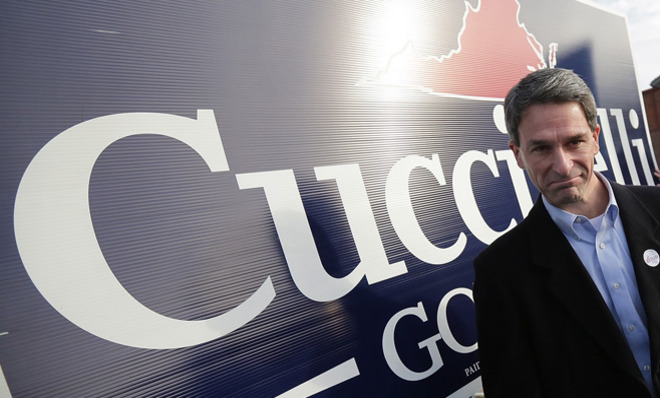The Virginia GOP actually blew the gubernatorial race a year and a half ago
The Tea Party takeover of the Virginia Republican Party could prove quite costly


A free daily email with the biggest news stories of the day – and the best features from TheWeek.com
You are now subscribed
Your newsletter sign-up was successful
Democrat Terry McAuliffe is poised on Tuesday to win Virginia's gubernatorial election — even though a plurality of voters there don't like him.
Yes, polls heading into Election Day uniformly show McAuliffe leading by mid-single to low-double-digit margins over his Republican rival, Attorney General Ken Cuccinelli. Yet at the same time, only 42 percent of voters have a favorable opinion of McAuliffe, according to the latest Quinnipiac poll.
How is it possible that such an unpopular candidate could win statewide office?
The Week
Escape your echo chamber. Get the facts behind the news, plus analysis from multiple perspectives.

Sign up for The Week's Free Newsletters
From our morning news briefing to a weekly Good News Newsletter, get the best of The Week delivered directly to your inbox.
From our morning news briefing to a weekly Good News Newsletter, get the best of The Week delivered directly to your inbox.
The short answer is that the state GOP shot itself in the foot by nominating the Tea Party–aligned Cuccinelli in the first place. The longer answer involves a spoiled deal, intra-party machinations, and a Tea Party takeover of the Virginia Republican Party that resulted in that same nomination.
Outgoing Lt. Gov. Bill Bolling (R) could have been hours away from being elected the commonwealth's next chief executive. Under a widely known deal struck back in 2009, Bolling agreed to not challenge Gov. Bob McDonnell, then the state's AG, in a primary, instead deferring to him with the understanding he would serve as the Virginia GOP's next standard-bearer.
Yet Cuccinelli, whose politics place him to the right of Bolling, announced in December 2011 he wanted the job too, setting up a potentially fractious primary between the two wings of the state party. Bolling represented the more moderate side of the state GOP, while Cuccinelli, who made a name for himself fighting against sodomy, gay marriage, and ObamaCare — he filed a lawsuit against the health-care law the same day President Obama signed it — represented the more conservative, Tea Party side.
The primary never happened, though the battle still played out through a different nominating process.
A free daily email with the biggest news stories of the day – and the best features from TheWeek.com
Ahead of the Virginia GOP's June 2012 convention, Cuccinelli's "Tea Party supporters quietly took control of the state GOP leadership," according to The American Prospect's Abby Rapoport and Amelia Thomson-Deveaux. Then, despite protests from Bolling and McDonnell, the new party leaders voted to reverse course and nominate candidates for statewide office not through a primary, but through a closed convention "where the extreme wing of the party was more likely to be in attendance."
The change was supposedly intended to save money and prevent Democrats and Independents from messing with the primary process. (Virginia has open primaries, meaning voters can cast a ballot in any party's primary.) But in practice, it meant that a small pool of the most active party members would get to pick the 2013 slate.
The switch was thus a huge win for Cuccinelli, since his backers were more liable to stack the convention. Sensing defeat, Bolling called it quits on his campaign a few months later, giving Cuccinelli a smooth path to the nomination and leaving his party with a prophetic warning.
"At a time when we need to be involving more people with more diverse views in our party, our party's leaders selected a method of nomination that is by its very nature exclusive," he told The Richmond Times-Dispatch.
In June, convention attendees handed Cuccinelli the nomination. They also nominated far-right firebrand preacher E. W. Jackson — a man who likened yoga to Satanism and warned against Obama's "Muslim sensibilities" — to run as the party's lieutenant governor nominee.
In short, convention participants sacrificed bipartisan appeal for ideological purity, leaving the party with two dyed-in-the-wool conservatives whose views no longer represented a majority of voters in the increasingly purple state. Cuccinelli, despite coasting to the GOP nomination, is still viewed unfavorably by a majority of Virginia voters.
It's the same story that has played out elsewhere in the nation, where Tea Party activists have nominated fringe candidates who have gone on to flop in general elections. (Remember Christine "I'm not a witch" O'Donnell?)
Of course, there's no guarantee that Bolling would have won the race had he captured the nomination. The government shutdown badly bruised Cuccinelli's already floundering campaign, and it would likely have been a weight on Bolling's campaign as well. Yet the state GOP leadership did itself no favors by running right and cloistering itself from the will of the party at large.
Cuccinelli may inspire the Tea Party faithful, but he has a mountain of public opinion to overcome if he's going to pull out a miraculous win Tuesday.
Jon Terbush is an associate editor at TheWeek.com covering politics, sports, and other things he finds interesting. He has previously written for Talking Points Memo, Raw Story, and Business Insider.
